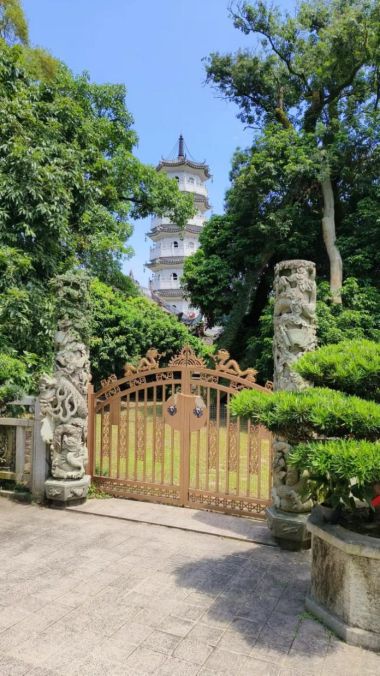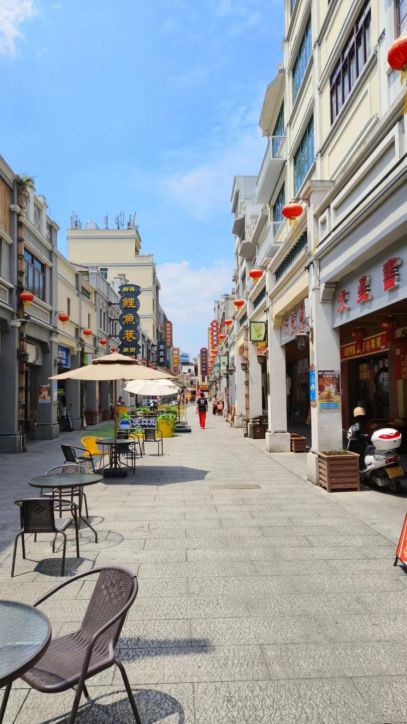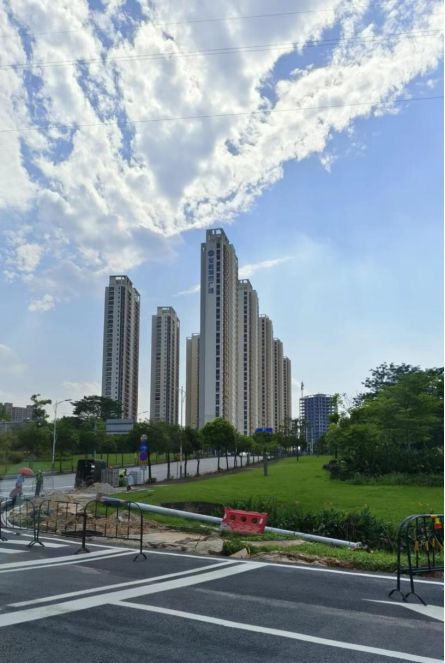A friend asked me where was Yunfu. My answer was that it’s in Guangdong province but it’s the poorest city in the province which might account why my friend hadn’t heard about it.
That, apparently was the wrong thing to say and this is where our cultural differences come into play. Why, she asked me, did I need to say it’s the poorest city, why couldn’t I just say it’s on the Western edge of Guangdong, bordering Guangxi?Besides, she said, it’s no longer the poorest city in Guangdong.
So, we did some research and, on the list of Guangdong cities, it’s the one with the lowest GDP, technically therefore, I was right(which is always nice), but there was more. The GDP has increased significantly in the last 20 years and doubled from 59 billion RMB in 2013 to 120 billion in 2023. In other words, despite being the lowest performing GDP in the province, it’s actually also one of the fastest growing.
We decided to compromise on my statement and not say“it’s the poorest city in the province”but change the wording to:“it’s the least rich city in Guangdong”to be more accurate. The word poor shouldn’t be used in Guangdong anymore thanks partially to the massive input from the Greater Bay Area(GBA).
Yunfu is a little more than a growing city, it’s also the newest city in Guangdong. 30 years ago, it was a smaller part of Zhaoqing a much bigger neighbouring city. In 1994 a decision was made to create a new city, that was Yunfu. Yunfu is the largest inland river port in Guangdong Province. Products are shipped from here to Guangzhou, Macau, Hong Kong and the rest of the world.
We were in Yunfu just a few months ago. It was my third time and the middle visit was an example of how the GDP is changing. As a favour to a friend, I had been asked to visit a new private international school and speak to a few students. It turned out what they wanted me to do was giving two presentations to over 400 English language students in each presentation about the differences between education in Australia and in China. That’s 800 students in a private school paying fees to study when they could be in a state-run school for free.
Something we often forget when we look at China’s improvements in infrastructure and poverty alleviation is that the most important aspect is ensuring the rise out of poverty is sustainable. Education starting from primary school is a major aspect of that. Without education, the young people won’t be able to sustain the gains of the current generation and one thing I’ve found that China is very good at is ensuring that people of the current generation have a better life than people of the past. Ensuring the people of future generations continue along that trajectory is going to be a very important feature of the continuation of poverty alleviation and rural revitalization.
On my arrival at the school, I was astounded. It had many basketball courts, I didn’t count, I’m not even sure if I saw them all. The campus is so big, it had two football pitches and a swimming pool, the auditorium I was in I was told was one of three, it could hold 1000 students comfortably and was equipped with all the latest technology. Did I use Windows or Apple they asked, it wouldn’t matter, they had all the necessary connections in place and everything was done remotely from a control room that would have made a TV producer jealous. In short, it was one of the best equipped schools I’ve ever been to and it was in the“least rich city”in the province. I also stayed in a very good quality but unstarred business hotel, right across the road from the school which was nice because hotels had been a problem on my previous visit.
I am rarely critical of China but where I am, it’s usually because of personal experience and hotels in many places have been the cause of one of the biggest complaints I have about living and travelling in China.
The first time we visited Yunfu was in 2021, halfway through the Covid Pandemic and it was memorable. We arrived there by bike on our way to Guangxi and it had been a hard ride, there are a lot of hills, locals might call them mountains but they rarely go above 1000 metres, the problem is they are all steep. Cycling up to 2, 500 metres in Shaanxi or Gansu is a lot easier than climbing to 800 metres in Guangdong. It might take two hours to climb to the top and we would have ridden just 15 kilometres, then there’s a 10-12 minute descent where we might cover another 5 or 6 kilometres before we would start to climb again.
Cycling through the Nanling mountains, which separate Guangdong from the rest of China is exhausting. the mountains were an almost impassible barrier in ancient times. For thousands of years, most transportation between Guangdong and the rest of China was by ship, because the roads across these mountains were just too difficult. This natural barrier created the language we know as Cantonese and the cultural differences between the rest of China and Guangdong.
Yunfu is near the edge of this mountain range. There are two memorable aspects for us in Yunfu, one is that there appears to be only one single industry and the entire town appears to be involved in it. This obviously isn’t true but if you cycle through the city there is only one industry that is noticeable and that is stone. Yes, stone.
Yunfu is one of three cities in China which specialises in stone. It has a 400-year documented history in this industry and over 4, 000 businesses employing tens of thousands of people, probably a lot more than that when the peripheral industries such as machinery and transportation are considered. Cycling through the city to the outer suburbs and there are stone showrooms after stone showrooms. One road going through the outskirts of the city is the G324 National Highway and we cycled many kilometres passing more stone showrooms than is possible to imagine.
Yunfu stone has been exported all around the world, much from that massive inland river port, but a huge amount of it has been utilised inside of China. It is this aspect which has ensured that despite its geographical location, Yunfu has benefited greatly from the massive infrastructure projects throughout China and also, because of its geographical limitations, from Poverty Alleviation.
Poverty alleviation in Yunfu didn’t just focus on stone products, that would have been too easy. Although they have increased the amount of mechanised stone cutting and now, there is no stone cut by hand, machines do all that work but there are also robust aquaculture and eco-tourism industries.
I said there were two memorable moments for us in Yunfu. The other was something I had experienced in a restaurant but never at the side of the road. In English, it’s sometimes called beggars chicken presumably because it can be cooked without an oven or a pot and it’s perhaps one of the most delicious way to eat a chicken.
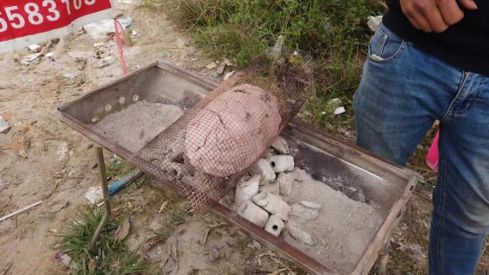
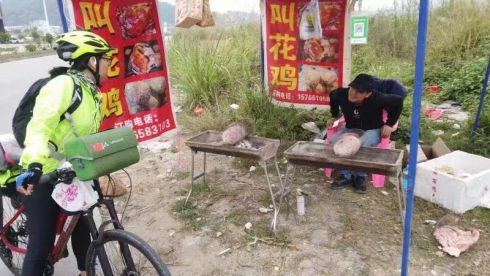
beggars chickenThe chicken is first wrapped in leaves, large leaves from a plant like a lotus, or perhaps even a banana leaf would suffice. if you’re doing it at home, you might use foil but that wouldn’t impart the same flavour. Then a mud or clay outer layer covers the entire thing until it’s the shape of what I would call a rugby ball. It’s then slow roast in an oven, the photo here shows it being heated over charcoal barbecues but this is just to keep them warm, the real cooking used to be done in the ground with hot earth or stones but I suspect when buying these we were buying products that had been prepared in an oven. That doesn’t take away from the flavour, they are delicious. There are still places where you can find these at the sides of the road and for sure we will be enjoying another one in future rides;they are not unique to Yunfu but that is the first place I’d seen them for sale. By the time we got it to our hotel room and managed to finally check in, the chicken was still piping hot. The only drawback we experienced was the fact that it was heavy and had to be carried on my handlebars for over 10 kilometres before we hit the main part of town and for an additional 30 minutes.
It was eco-tourism that took us to Yunfu on our most recent trip. Taking a look at the tourism opportunities, a hot springs resort in the mountains, just 90-minute drive from downtown Guangzhou, only three hours by high-speed train from the centre of Shenzhen or Hong Kong. Yunfu has the feel of a place where it’s possible to get away from the hustle and bustle of any big city.
This was a personal visit for us, we wanted to see how things had changed and learn if there were improvements and we most certainly found that there are. One thing is that since 2014, it’s been possible to get there by high-speed train. From Zhongshan, where we live, there is a direct line to Nanning and Yunfu is about halfway, less than three hours from our front door to a hotel in Yunfu is pretty good, travelling 194 kilometres on the Guangdong transportation system where they tell me, no city is more than two hours from Guangzhou now. Our first trip there took three days by bike and my second trip was over three hours by car.
The city has a population of only 2. 3 million, this is large by European standards but very small on the scale of Chinese cities. It’s spread over 7, 779 square kilometres, compared to Guangzhou’s 18 million people in only 7, 434 square kilometres. In other words, there is a lot of space to find seclusion and, as we who have cycled in there now know, there are a lot of hills, mountains and rivers to cross.
Lots of mountains and rivers are keywords to the adventurist it means there are plenty of great places to hike, mountain climb and even some whitewater rafting. We headed up to the Xin Xing hot springs resort at the invitation of some friends who picked us up for the 90-minute drive from the city centre to a room with a most spectacular view. Although I lived in Australia for many years, I was born in the UK and first of all finding a city no one has ever heard of with over 2 million people can be a bit of a surprise, but what’s more surprising for people like me is being picked up to be taken to a hotel in the same city and told the journey will take over 90 minutes.
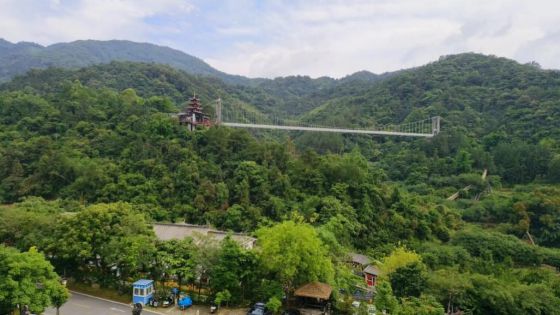 Yunfu
YunfuThe resort boasts many activities but since this isn’t a promotion, let’s just say it’s a place that should be experienced, the entire region has a climate that is similar to but different from the rest of the province, the weather is warm but feels cooler, there’s not so much humidity as might be expected in Guangdong so it’s a great place for people who say they don’t like Guangdong’s weather to visit and enjoy.
Yunfu has it all, there is a tea culture, there is a traditional Chinese Medicine Culture, there are mountains with magnificent scenery but the one thing I didn’t notice when looking around was poverty.
It’s normal when travelling around China to find ancient villages and indeed, Yunfu has a few but they are no longer what we’d expect. There are cars parked outside old homes, there are air-conditioners rumbling away keeping the occupants cool in summer and warm in winter, there are high speed trains and freeways running through the city, there are remnants of ancient philosophies and there are signs of affluence in the same place and there’s an air of change.
In fact, Yunfu is a microcosm of modern China, I asked our driver if he could take me to an old village so I can get some comparative pictures. He couldn’t, he took us to several villages but all of the homes were two and three story, all were more modern that I was hoping for and all showed indicator of recent wealth or, if not wealth, at least the accumulation of some prosperity.
They have modern appliances, they go to work on motorbikes or in cars, they come home to a cool or warm apartment and they can make money from richer tourists travelling to their formerly impoverished regions. In fact, the people who live there have a specific purpose, they are the people who work to ensure we don’t forget the past. They are the custodians of living museums.
In Yunfu, almost everybody today is living better than their parents did and hopefully, this will continue so that the next generations will live better than today–if Yunfu is any guide to what the future holds, we can confidently predict that they will.



